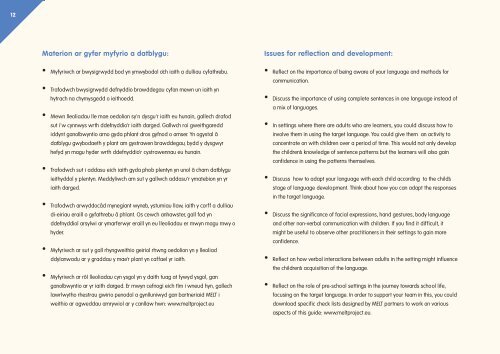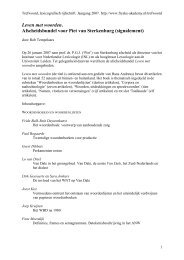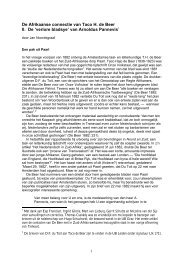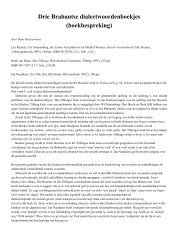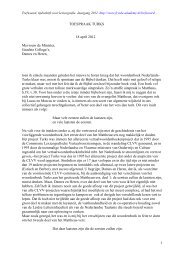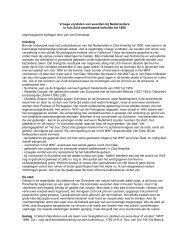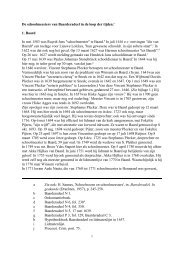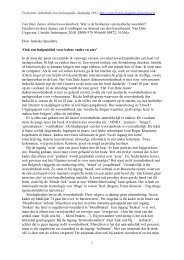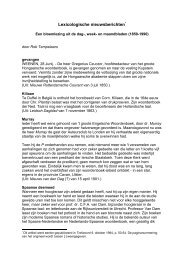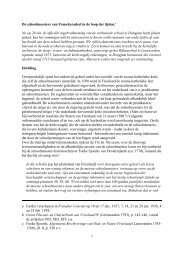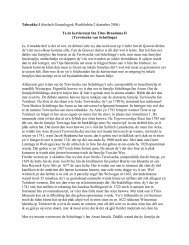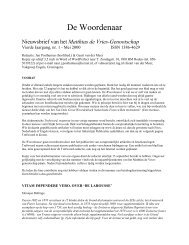language - Fryske Akademy
language - Fryske Akademy
language - Fryske Akademy
Create successful ePaper yourself
Turn your PDF publications into a flip-book with our unique Google optimized e-Paper software.
12<br />
Materion ar gyfer myfyrio a datblygu:<br />
• Myfyriwch ar bwysigrwydd bod yn ymwybodol o'ch iaith a dulliau cyfathrebu.<br />
• Trafodwch bwysigrwydd defnyddio brawddegau cyfan mewn un iaith yn<br />
hytrach na chymysgedd o ieithoedd.<br />
• Mewn lleoliadau lle mae oedolion sy'n dysgu'r iaith eu hunain, gallech drafod<br />
sut i'w cynnwys wrth ddefnyddio'r iaith darged. Gallwch roi gweithgaredd<br />
iddynt ganolbwyntio arno gyda phlant dros gyfnod o amser. Yn ogystal â<br />
datblygu gwybodaeth y plant am gystrawen brawddegau, bydd y dysgwyr<br />
hefyd yn magu hyder wrth ddefnyddio'r cystrawennau eu hunain.<br />
• Trafodwch sut i addasu eich iaith gyda phob plentyn yn unol â cham datblygu<br />
ieithyddol y plentyn. Meddyliwch am sut y gallwch addasu'r ymatebion yn yr<br />
iaith darged.<br />
• Trafodwch arwyddocâd mynegiant wyneb, ystumiau llaw, iaith y corff a dulliau<br />
di-eiriau eraill o gyfathrebu â phlant. Os cewch anhawster, gall fod yn<br />
ddefnyddiol arsylwi ar ymarferwyr eraill yn eu lleoliadau er mwyn magu mwy o<br />
hyder.<br />
• Myfyriwch ar sut y gall rhyngweithio geiriol rhwng oedolion yn y lleoliad<br />
ddylanwadu ar y graddau y mae'r plant yn caffael yr iaith.<br />
• Myfyriwch ar rôl lleoliadau cyn ysgol yn y daith tuag at fywyd ysgol, gan<br />
ganolbwyntio ar yr iaith darged. Er mwyn cefnogi eich tîm i wneud hyn, gallech<br />
lawrlwytho rhestrau gwirio penodol a gynlluniwyd gan bartneriaid MELT i<br />
weithio ar agweddau amrywiol ar y canllaw hwn: www.meltproject.eu<br />
Issues for reflection and development:<br />
• Reflect on the importance of being aware of your <strong>language</strong> and methods for<br />
communication.<br />
• Discuss the importance of using complete sentences in one <strong>language</strong> instead of<br />
a mix of <strong>language</strong>s.<br />
• In settings where there are adults who are learners, you could discuss how to<br />
involve them in using the target <strong>language</strong>. You could give them an activity to<br />
concentrate on with children over a period of time. This would not only develop<br />
the children’s knowledge of sentence patterns but the learners will also gain<br />
confidence in using the patterns themselves.<br />
• Discuss how to adapt your <strong>language</strong> with each child according to the child’s<br />
stage of <strong>language</strong> development. Think about how you can adapt the responses<br />
in the target <strong>language</strong>.<br />
• Discuss the significance of facial expressions, hand gestures, body <strong>language</strong><br />
and other non-verbal communication with children. If you find it difficult, it<br />
might be useful to observe other practitioners in their settings to gain more<br />
confidence.<br />
• Reflect on how verbal interactions between adults in the setting might influence<br />
the children’s acquisition of the <strong>language</strong>.<br />
• Reflect on the role of pre-school settings in the journey towards school life,<br />
focusing on the target <strong>language</strong>. In order to support your team in this, you could<br />
download specific check lists designed by MELT partners to work on various<br />
aspects of this guide: www.meltproject.eu.


